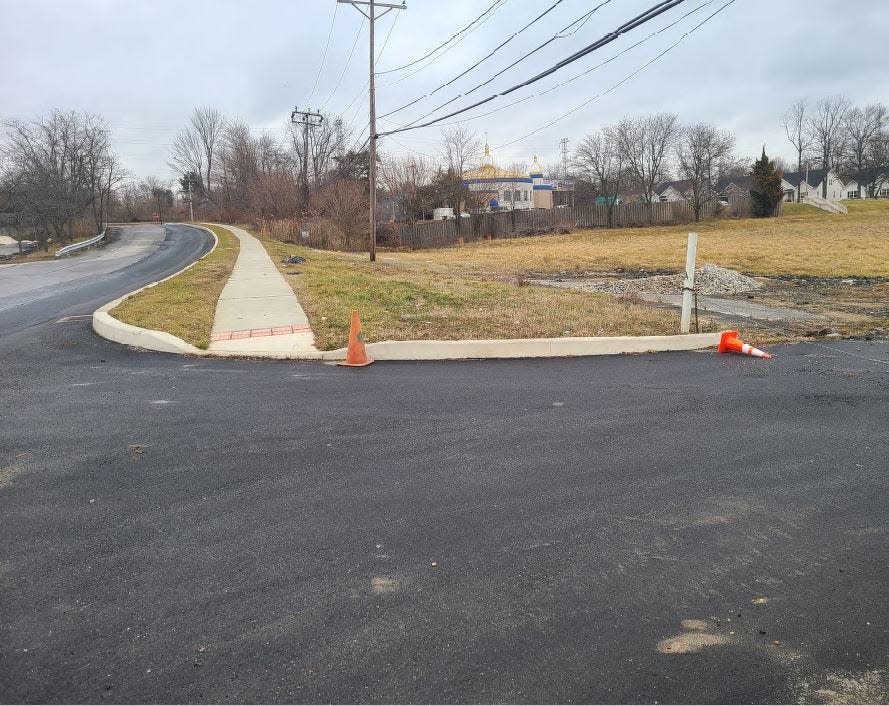A legal dispute over a sidewalk focuses on Mayor Purzycki's role in Capano development
A sidewalk built just over Wilmington's border is the center of a lawsuit that accuses Mayor Mike Purzycki of overstepping his authority − and the city limits − to benefit a planned apartment-building development by Louis Capano III.
The lawsuit revolves around two properties off Miller Road: the Capano-owned, former Riverside Hospital tract right inside the city limits and the Miller Road Commons, a shopping center that hosts the Home Depot and sits just outside the city limits. The two properties are separated by 37th Street, which runs multiple feet inside and parallel to the shopping center's border.
In early 2019, Capano, the scion of one of Delaware's most prominent developer families, needed neighbors and city officials to support his push to rezone the former hospital tract, which is also bordered by West Lea Boulevard, to build hundreds of apartments.
Neighbors wanted the apartments' traffic to be partially funneled onto a new entrance to 37the Street across the property from Lea Boulevard and complete with pedestrian access. To provide that additional pathway, Capano needed an easement agreement from the shopping center owner, a legal entity that court documents show is represented by David Rosen, executive vice president of Rosen Management Corp. based in New York state.
Purzycki helped enable that access, according to the lawsuit.
It states that Purzycki contacted Rosen's firm and pitched Capano’s plans for the neighboring property as well as the developer’s desire to obtain an easement deal. And to sweeten the deal for Rosen, Purzycki’s then-police chief wrote a letter committing more police resources to patrolling the shopping center, despite it being outside the city, according to documents filed in the litigation.
The correspondence was included as an exhibit in the easement contract signed by Capano and a representative of Rosen's company, giving Capano the authority to tie his development into 37th Street over a sliver of shopping center property.
Later, Purzycki would reach a separate agreement with Capano that allows the city to build improvements in the easement and gives the city authority to make the monthly payments that Capano owes to Rosen's firm for the easement in the event the developer defaults. That agreement also gives the city the "right" to pay the costs of any breach of the easement agreement and to potentially claw back any costs from Capano, according to a copy included in the court filings.
City Council would eventually approve the rezoning for the development. But five years later, the only signs of work on the property is the sidewalk built alongside 37th Street.

The sidewalk is the center of the current litigation. Rosen's attorneys accuse Capano and the city of colluding to build hundreds of feet of sidewalk in violation of and far exceeding the scope of the easement and in violation of the city's territorial jurisdiction.
In legal correspondence that preceded the lawsuit, an attorney for Capano wrote that the sidewalks were installed at the behest of both Purzycki and Sen. Tom Carper. Emails included in the rezoning submissions for the property show Martha Carper, the senator's wife, serving as a go-between in discussions involving Capano as well as city officials and neighbors of the property.
The city's reply to the lawsuit acknowledged requesting Capano build the sidewalk, but says it was in its legal authority to do so. It denies any wrongdoing. In admitting Purzycki spoke to the shopping center's representatives about the easement, the city denied any characterization that the mayor was acting as Capano's "agent," according to its initial reply to the lawsuit.
Further, Capano has filed a counterclaim, arguing the city had the authority to request the sidewalks be built and that Delaware state transportation officials “granted and ratified” that authority after the controversy arose, according to court documents. Capano's attorneys have denied any legal wrongdoing in court filings and disputed the retelling of the situation offered by Rosen's lawsuit.
Attorneys for both sides either declined comment or did not reply to requests for such. Spokespersons for Purzycki and Carper also declined comment. Rosen did not return a phone call seeking comment.
How the city helped Capano cut a deal
Capano closed on the 4.6-acre tract next to the golden-domed St. Nicholas Ukrainian Catholic Church on Miller Road in 2019. Transfer tax receipts indicate he paid $600,000 for the property.
Before acquiring the property, he had talked with neighbors about his intentions. Those intentions and the demands of the local Brandywine Hills Community Association were included in a contract between the association and Capano in May 2019.
In return for the organization's support for rezoning the property to allow for apartment development, the contract sets that the development will contain a maximum of 163 apartments and includes provisions for the minimum number of parking spaces that can be built, the types of materials to be used and setbacks along Lea Boulevard as well as a list of other requirements.
The requirements also include that 37th Street on the property's western border be the complex's primary entrance and exit with sidewalks lining the road. The legal status of 37th Street alongside the property is critical to the dispute. The street runs through property controlled by the Miller Road Commons' owner.
Months before Capano finalized his agreement with the civic association and closed on the property, Purzycki contacted a representative of the shopping center property, "purportedly on behalf of" Capano to pitch the developer's intent for the property and an easement deal to grant him access over a small portion of shopping center property to tie his development to 37th Street, according to the lawsuit.

The complaint states that Rosen's firm was "induced" to agreeing to the new entrance because Capano's development would increase "foot and vehicle traffic" and "business" to his shopping center. There was also a more tangible financial benefit.
The final agreement, included in court filings, includes provisions that provide the shopping center owner with a one-time $25,000 payment as well as $2,000 per month in regular payments that compound by 12 percent every five years while the permanent easement is in effect.
City News: Accused of begging inside Market Street restaurants, she was jailed for a year
It also includes a section setting out that "adequate security and reasonable police response time" at the shopping center are of "material importance" and a "primary consideration" for Rosen's firm in reaching the agreement.
That section references that Robert Tracy, then-chief of police for Wilmington, had agreed that his department would "work jointly with Delaware State Police" to "address quality of life concerns" at the shopping center. It also includes provisions about the use of private security at Capano's cost if those measures are deemed inadequate.

The contract includes a letter written by Tracy to Purzycki months before the easement was finalized and stating that he had talked to Delaware State Police officials about the shopping center.
"While the Delaware State Police maintains jurisdiction and fields calls for service for this property - which is considered part of New Castle County - we will be working jointly with Delaware State Police to provide directed patrols and mutual aid to help address some of the quality-of-life concerns that have been reported in and around this shopping area," the letter states.
In return, the easement grants Capano what the lawsuit describes as a "limited easement to facilitate access to the planned housing development," specifically the use of an area of land 10 feet wide and 110 feet long.
The agreement was signed by Capano and Rosen's firm in April 2020. The lawsuit claims that Capano then went behind the shopping center owner's back and signed a secondary agreement with city officials months later.

The additional agreement assigned Capano's rights to build easement improvements to the city without providing notice to Rosen, according to the lawsuit. In addition, the agreement includes provisions that grants the city authority to make payments owed by Capano to Rosen's firm for the easement as well as to pay for any cost associated with a breach of the original easement agreement, according to the document. It also includes provisions to allow the city to claw back any of those costs through a lien on the property.
That agreement was signed by Purzycki and Capano in December 2020.
The city side-deal and police-presence provisions are detailed in exhibits to the lawsuit filings, but don't play a primary role in the litigation.
Claims and counterclaims over the sidewalks
City Council ultimately approved rezoning the property, but in the years since, only legal wrangling has followed the June 2022 construction of the sidewalk lining 37th Street.
The lawsuit claims the sidewalk extends 875 feet onto the shopping center property, hundreds of feet outside the easement area and violates the terms of that agreement and was built "at the direction and coordination of the city," despite being built on private property outside the city limits.
A December 2022 letter by an attorney representing Rosen's firm to Capano also notes that the sidewalks and the easement improvements appear to have been built without proper permitting or insurance, which is also in violation of the easement terms. The letter notes that attempts by Rosen's firm to discuss the issue with Capano via telephone and email had been "ignored."
In February 2023, Purzycki wrote a letter to Capano's attorney, confirming that the city "requested the sidewalks be installed" on the shopping center land. He notes his office is now engaging state transportation officials about the authority to do that and that the city would fight any attempts by Rosen to have Capano remove the sidewalks.
The next day, Capano's attorney writes to Rosen's stating that the sidewalks were installed within the "public right of way" at the request of Purzycki and Carper. The letter goes on to state that the sidewalks were not subject to the easement agreement.
Crackdown: What happened when a Delaware prisoner tried to boycott the internet behind bars
In April 2023, Rosen's attorney gives Capano seven days to respond to a series of issues before termination of the easement.
It also reemphasizes the list of things they believe violate the easement. It also disputes the idea that the city had a right to order sidewalks built alongside the road. The letter includes correspondence with a Delaware Department of Transportation official stating that DelDOT, which maintains many state and county roads, has no ownership or maintenance authority over that portion of 37th Street and describing it as "private."
Court filings indicate that months after that letter the city and DelDOT signed an agreement in December 2023 conveying maintenance authority to Wilmington for that portion of 37th Street.
Among the allegations about the city's lack of authority to build the sidewalk and the sidewalk's encroachment onto his property, Rosen's lawsuit claims that Capano breached provisions of the agreement that require any work in the easement area be properly permitted, that Rosen's firm receive those permits and that Capano insure the easement improvements.
It asks a judge to declare the easement void, order the removal of the sidewalks and award other costs.
Capano's reply denies any legal wrongdoing.
Citing old land development plans, his counterclaim states that as far back as 1989, Rosen's firm had dedicated the portion of 37th Street running through the shopping center property for public use. In doing so, Rosen ceded some control over that portion of his property and that Capano, at the city's direction, had rightfully installed the sidewalk in a public right of way, Capano's counterclaim states.
Watchdog effort: A renewed, bipartisan effort to create Delaware government inspector general watchdog
It adds that the city has such authority and that authority was "recently confirmed and ratified" by state transportation officials in the December 2023 agreement between DelDOT and the city.
It asks the judge to declare 37th Street a public right of way, confirm the easement is still valid and to prohibit the removal of the sidewalk.
Contact Xerxes Wilson at (302) 324-2787 or xwilson@delawareonline.com.
This article originally appeared on Delaware News Journal: Wilmington land dispute accuses mayor of overstepping city line

